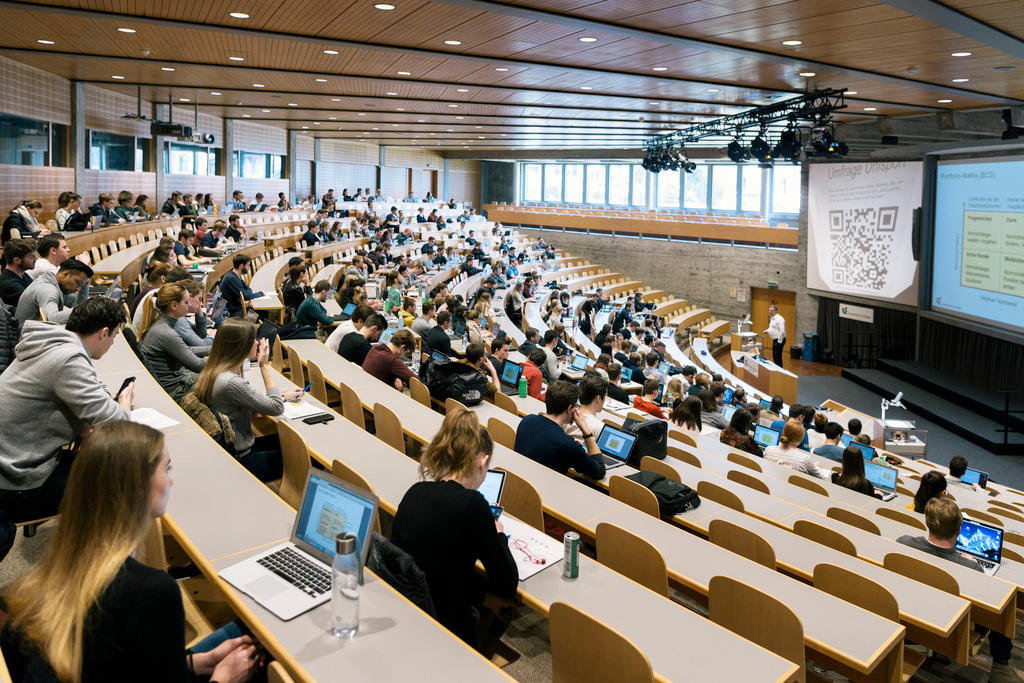Swiss universities ‘full to bursting’

Universities in Switzerland have been posting high student numbers as the new academic year begins, with the trend likely to continue. Is there a risk of the country turning out too many academics?
Some have even seen record highs, such as the Federal Institute of Technology Zurich (ETH Zurich) which said mid-September that it had more than 21,000 studentsExternal link – up from just over 20,000 last year. The University of Lausanne has also seen a 2% increaseExternal link over last year to 15,300 students this term.
Institutes are already extending their campuses. The University of St Gallen is planning a huge construction project in the city centre, which will cost CHF160 million ($161 million) External link – a move that has to be approved by local voters first.
Space is already tight with 8,600 students. “Our campus currently offers enough room for 5,000 students. We are getting by with temporary solutions. These are expensive and not the best quality,” rector Thomas Bieger has saidExternal link.
The University of Bern has converted a former Swiss Federal Railways headquarters into a university building, complete with library – at a cost of CHF40 million. More projects are in the pipeline. “The development of additional space and research infrastructure is one of the biggest challenges at the moment,” said rector Christian Leumann in a statementExternal link to mark the beginning of term.
Run on higher qualifications
The popularity of tertiary education – higher education as well as vocational education beyond secondary school – accounts for the need to expand, Martin Fischer from the State Secretariat for Education and Research (SERI) told Swiss public television, SRF, in September.External link
Currently a third of these tertiary qualifications are in universities, a third are taken at universities of applied sciences and a third in further vocational education, he said.
In total, 40% of the population takes one of these qualifications – and the trend is rising, projected to almost 60% by 2045External link.
Concerns
But what does this mean for the future? Is the classic apprenticeship – the dual system which sees education combined with working in a company, for which Switzerland is so renowned – under threat? And will there be too many academics?
+ Read more about this dual system here, which two thirds of school leavers currently choose
No, says education expert Antonio LoprienoExternal link, the former head of the umbrella body Swiss Universities and former rector of the University of Basel.
For him, the popularity of tertiary education is a good development. Society needs flexible young people to progress into specialised professions that need certain qualifications, he told SRF.External link
The current president of the European Federation of Academies of Sciences and Humanities also pointed out that if you compare student numbers with those of Switzerland’s neighbours, it was clear that “academisation in Switzerland was still a lot slower than in other countries”.
Switzerland has a vocational system and a political landscape that “luckily protects the dual education system and defends it against any dangers. I don’t think the classic apprenticeship is under threat at all,” he said.
But he also wanted an openness towards academic qualifications, whether from universities or universities of applied sciences, as these are also necessary in today’s knowledge-based society.

In compliance with the JTI standards
More: SWI swissinfo.ch certified by the Journalism Trust Initiative




You can find an overview of ongoing debates with our journalists here. Please join us!
If you want to start a conversation about a topic raised in this article or want to report factual errors, email us at english@swissinfo.ch.